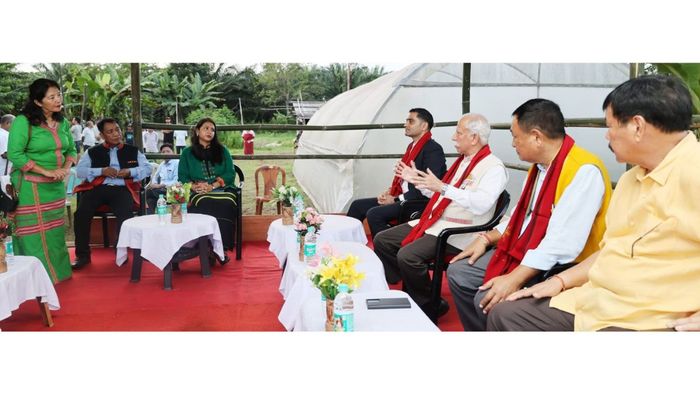Arunachal pushes oil palm cultivation to boost farmer income and reduce import dependence
Arunachal Pradesh Governor Lt. Gen. KT Parnaik (Retd.) visited a 4-hectare oil palm farm in Bosi Didum Village near Pasighat on October 6, underscoring the State Government’s drive to expand oil palm cultivation.

- Oct 07, 2025,
- Updated Oct 07, 2025, 11:59 AM IST
Arunachal Pradesh Governor Lt. Gen. KT Parnaik (Retd.) visited a 4-hectare oil palm farm in Bosi Didum Village near Pasighat on October 6, underscoring the State Government’s drive to expand oil palm cultivation.
During the visit, Governor Parnaik interacted with farmer Miti Megu Perme, other local farmers, and agriculture officials to gain firsthand insight into the farm’s operations. He highlighted that oil palm cultivation is more than an agricultural activity—it is a strategic step toward economic growth, farmer empowerment, and national self-reliance. Noting India’s heavy dependence on edible oil imports, the Governor said promoting oil palm can strengthen the rural economy, stabilize prices, and reduce import dependence.
“Arunachal Pradesh has fertile soil, abundant rainfall, and a favorable climate ideal for oil palm. For farmers, it provides steady income, long-term security, and better returns than most other oilseeds,” he said. He also praised the State Government’s policies, which aim to improve livelihoods, create employment, attract investment, and strengthen market linkages.
Sharing the State’s agricultural progress, the Governor said Arunachal Pradesh produced over 5.19 lakh metric tons of food grains, nearly 15,000 metric tons of pulses, and over 39,000 metric tons of oilseeds last year. Oil palm cultivation has expanded to 4,690 hectares, benefiting nearly 2,000 farmers under the Per Drop More Crop scheme. The State targets 35,723 hectares under oil palm by 2025-26, supported by processing units like the crude palm oil mill at Roing and a new factory at Niglok.
Miti Megu Perme, who established her farm in 2017 and began harvesting in 2021, said the farm yields 2 to 3 tonnes of palm oil per harvest, 3 to 4 times a month. She noted that the new Niglok factory has created a steady market, boosting local demand. East Siang Deputy Commissioner Sonalika Jiwani added that oil palm cultivation offers highly remunerative and sustainable income opportunities for the region’s farmers.
Governor Parnaik also inaugurated the Psychotropic Substances and Psychosocial Centre and the Human Performance Laboratory at the Rashtriya Raksha University (RRU) Pasighat Campus. He digitally unveiled the foundation stone for the Centre of Excellence for Testing of Drugs, emphasizing that these initiatives will strengthen the State’s fight against drug abuse while supporting rehabilitation.
Addressing societal challenges such as cybercrime, terrorism, religious disharmony, and activism misuse, the Governor stressed the importance of balancing freedom with responsibility, fostering community trust, and leveraging technology wisely. He urged law enforcement to adopt preventive, technology-driven, and community-focused strategies under the concept of “Smart Policing.”
Speaking to students, Governor Parnaik encouraged them to pursue education with integrity and innovation, instilling the ‘Nation First’ spirit and contributing to the vision of a developed India. He lauded RRU for its focus on leadership, sports science, and character building, calling it a “nursery of national service.”
The visit was attended by Advisor to Hydro Power Minister cum MLA Ninong Ering, local MLA Er. Tapi Darang, Superintendent of Police Pankaj Lamba, Deputy Commissioner Sonalika Jiwani, District Agriculture Officer Opang Moyong, RRU faculty, staff, and students.